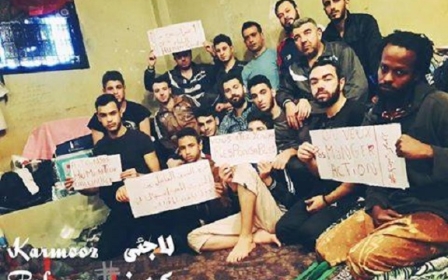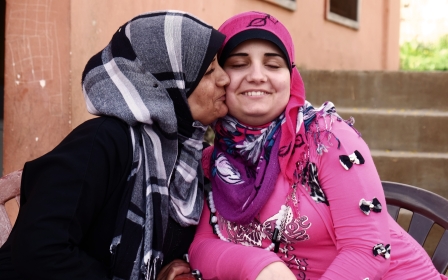The unpromised land for African refugees

Two weeks ago, almost all Jews in Israel celebrated the first day of Passover by reading and singing the Hagada, the centuries-old text which tells the story of the miraculous exodus of the Jewish slaves from the hands of their oppressors in Egypt.
But in a strange coincidence, just one day before Passover, Israel announced its intention to initiate a new exodus: a forced removal of some 40,000 asylum seekers from Eritrea and Sudan back to Africa, dangerously close to the hands of their former oppressors. A reversed Hagada.
This new policy became known almost by chance. Dozens of Eritrean asylum seekers were summoned to the Population and Immigration Authority where they were given a letter saying that "after working hard" during the last few months, Israel has found "a country which will host you".
Without naming it, the letter promises that this country "is in the process of economic development" and that it will provide them with residence and working permits. These Eritreans were given a simple choice: either accept this generous offer - which includes a $3500 grant - and leave Israel within 30 days or face an open-ended imprisonment in an Israeli jail.
In a court hearing a few days later, the Israeli authorities agreed to name these benevolent host countries – Rwanda and Uganda – but still refused to reveal the content of the agreements signed with them. A minister in the Rwandan government confirmed the existence of such an agreement, while the Ugandan government flatly denied it agrees to host refugees deported from Israel.
Using Rwanda and Uganda as target countries is not new in the ongoing attrition war between Israel and those tens of thousands of Eritreans and Sudanese who crossed its borders illegally in search of a safer and better life than the one they experienced in their war-torn countries.
Despite being one of the first signatories on the UN convention on refugees and despite the fact that most European countries view asylum seekers from Eritrea and Sudan as entitled to refugee status, Israel never welcomed them and refused to allow them any official status. At most, it granted them the right not be deported.
These "infiltrators", as they are officially named, were left in a legal no-man's land. They were not given work permits, although the authorities closed an eye when they were hired for day jobs in various positions, including governmental offices or even in military camps. They settled, or rather were settled, in the southern and poorer parts of Tel Aviv, bringing the already deficient services in these neighborhoods to the verge of collapse.
Israel was never very favourable to non-Jewish immigrants. Apart from the Law of Return, which gives every Jew the right to immediate Israeli citizenship, it has no immigration policy. For non-Jews it is almost impossible to obtain resident status, no matter how many years they have lived in Israel.
Even marrying an Israeli citizen does not necessarily help. A special "temporary" provision, prolonged again and again, denies Palestinians from the West Bank or Gaza Strip the right to reside in Israel, even if they marry Israeli Palestinian citizens. But even non-Palestinians who wish to get permanent status though marriage with Israeli Jews or Palestinians have to go through an extremely long and tiring process. Israel may be a promised land for Jews. Not so for non-Jews.
This exclusion becomes even more pressing when it comes to African legal or illegal workers and for African asylum seekers. According to official figures given by the Interior Ministry, by the end of 2014, the number of "infiltrators" (or asylum seekers) was 46,000, while the number of tourists who stayed in Israel after their visa has expired is almost double - 90,000.
Yet interestingly enough, only the "infiltrators", who come solely from Africa, are considered an urgent security or demographic threat and a hot political issue, while those "tourists", who mostly originate from ex-Soviet Union countries, are almost ignored.
It would be naïve not to attribute this different approach to the colour of their skin. Another factor is their religious background. Eighty percent of the asylum seekers are Christians from Eritrea, but in Israeli public opinion they are all tagged as Muslims, just because the rest of the refugees come from Sudan, mainly survivors of the massacres in Darfur.
These supposedly "Muslim infiltrators" are depicted by right-wing propaganda as part of a plot to change the Israeli demographic balance, one of the most sensitive issues in the Israeli Jewish frame of mind. Unfortunately, many of these claims have been adopted by the general public, so the chances of these asylum seekers winning sympathy are very slim.
This may explain why Israel is reluctant to grant refugee status to the asylum seekers from Sudan and Eritrea. While 90 percent of such requests by Eritrean nationals or refugees from Darfur are approved in Europe, in Israel just a few dozen of some 3,500 asylum requests filed by Eritreans and Sudanese were accepted. The rest of the African refugees in Israel claim they are not even given a fair chance to file a request.
Given these circumstances, it might be understood why Israel is almost obsessed by these 46,000 refugees. True, in the southern neighborhoods of Tel Aviv the conditions of living have deteriorated significantly and tensions are rising, but these African immigrants represent not more than 0.05 percent of the total Israeli population.
Refugee obsession
In December 2014 the Israeli parliament (Knesset) passed the third version of an anti-infiltration law, after two earlier versions were disqualified by the Israeli High Court for being "unconstitutional" and an infringement of basic human rights. According to the second version, approved in December 2013 - only to be cancelled in September 2014, all "infiltrators" were supposed to be sent to prison for one year and later locked in an "open" confinement facility for an unlimited span of time.
After this second version of the law was adopted, many in the asylum seeker community deemed it would be better to take the $3500 grant offered to them by the authorities and leave Israel rather than risk spending the rest of their days in prison. Some of them went directly back to Sudan and Eritrea, others went to Rwanda and Uganda, after receiving assurances that they would be able to reside and work in these countries.
According to the Hotline for Refugees and Migrants, an Israeli NGO, some 9,000 African refugees left Israel in this "voluntary exit" between the adoption of the second version of the law and its annulment a year later. Their fate is not encouraging. In a report based on interviews with 50 refugees, the Hotline for Refugees found that many those returning to their home countries were persecuted, tortured and even killed.
In Rwanda, according to the same report, this refugees were not given any legal status. Some of them paid as much as $1000 in order to smuggle their way to Uganda. There they were allowed to stay and even work, but very few of them were recognised as asylum seekers, so their future is far from certain. Other just went on with their agonising journey towards safe havens in Europe or elsewhere.
Human rights activists are very doubtful that this time, the agreements with Rwanda and Uganda will guarantee the Eritreans and Sudanese a fair living. The fact the Israeli government refuses to disclose these agreement makes them even more suspicious. They quote news reports about arms deals between Israel and Rwanda and Uganda as the secret motive behind these shady agreements.
These organisations are determined to fight this forced exodus in court, as they fight against the third version of the "anti-infiltration" law. The African asylum seekers are not tempted yet to "take the money and run". Even the tragic events of recent weeks, in which four small children from the African community died in makeshift and overcrowded kindergartens in Tel Aviv, did not convince them to leave.
Adam Bassar, one of the leaders of the Darfur community, even takes courage from the fact that after these tragic deaths, the government promised to give 15 million shekels ($4m) to improve the conditions in these "children warehouses", as they are now called in the Israeli press. According to Bassar, by giving this money the government signals it is recognising that this Darfur and Eritrean community is here to stay. But his optimism may be premature. Israel seems determined to let these peoples go, as far as possible.
- Meron Rapoport is an Israeli journalist and writer, winner of the Napoli International Prize for Journalism for a inquiry about the stealing of olive trees from their Palestinian owners. He is ex-head of the News Department in Haaertz, and now an independent journalist.
The views expressed in this article belong to the author and do not necessarily reflect the editorial policy of Middle East Eye.
Photo: African asylum seekers who entered Israel illegally via Egypt, wave the Eritrean flag, during a protest in front of the Knesset in Jerusalem, on January 8, 2014. (AFP)
Stay informed with MEE's newsletters
Sign up to get the latest alerts, insights and analysis, starting with Turkey Unpacked
Middle East Eye delivers independent and unrivalled coverage and analysis of the Middle East, North Africa and beyond. To learn more about republishing this content and the associated fees, please fill out this form. More about MEE can be found here.





